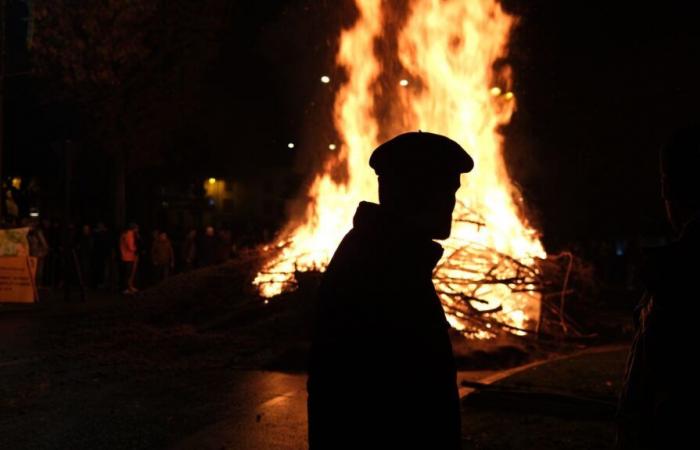Two months before a decisive vote in the chambers of agriculture, the Rural Coordination is trying to impose its muscular methods to break the historic monopoly of the FNSEA and the Young Farmers.
Giant barbecue on one side, burned tires on the other. Since Friday, November 15, agricultural unions have increased actions on the ground, with very different methods. They are mobilizing their troops to fight against the proposed free trade agreement between the European Union and the Mercosur countries and denounce the lack of state support for farmers. However, behind these demonstrations lies another fight: that of professional elections in the chambers of agriculture, organized in January 2025.
“They are very important and present a double challenge for agricultural unions”explains Jean-Christophe Bureau, professor of economics at AgroParisTech. Thus, they determine the political weight of the unions. “This is the test to know whether the government will receive you or not during the negotiations,” summarizes the expert. In addition, they determine a large part of the financing of organizations. “There are huge budgets given to unions based on results”notes Jean-Christophe Bureau.
For several decades, the alliance between the National Federation of Farmers' Unions (FNSEA) and the Young Farmers has reigned in France and Corsica. As the specialized media Terre-net points out, the duo won more than 55% of the votes in the last elections. Only three departments were won by Rural Coordination (Lot-et-Garonne, Vienne and Haute-Vienne), which obtained 21.5% of the votes at the national level, just ahead of the Confédération paysanne (around 20%). This balance could however change, assures Jean-Christophe Bureau: “Today, the quasi-monopoly of the FNSEA is challenged by the Rural Coordination.”
In Dordogne, this fierce battle is already underway, before the eyes of the inhabitants. A mountain of manure, straw and tires was dumped and burned in front of the prefecture on November 19 by the Rural Coordination, which came second in the department during the 2019 elections. “We are not going to die in silence and it is not going to stop today!”launched their charismatic leader, Rémi Dumaure. A muscular method that has become the signature of this union, which vehemently denounces a “agricide” in France and “co-management” of the FNSEA with the State and agro-industry. Result: the number of members in the department has increased sevenfold, underlines France Inter.
On November 18, the atmosphere was very different in the city center of Périgueux. After a giant barbecue open to all, “we'll leave things clear this evening”, had warned Guillaume Testut, president of the Young Farmers of Dordogne. With his allies from the FNSEA, he assumes “a change in operating mode”. “It’s very important to have public opinion with us”he slips, smiling. At his side, the departmental vice-president of the FNSEA, Jean-Philippe Granger, is also more “reasonable” than the other unions regarding the agreement with Mercosur. “We too must export”breathes the one who is also president of the departmental chamber of agriculture.
A few dozen kilometers away, François Soulard, spokesperson for the Confédération paysanne, comments on the match remotely. “If it hadn’t been for the union elections, we wouldn’t have heard them”whispers the breeder, remaining with his sheep. His union, classified on the left, came in third position in the department in 2019. Today, he does not believe in the sincerity of the FNSEA when it opposes free trade. “It’s a marketing operation”he assures. “They were overwhelmed by their base in January [lors des précédentes manifestations d’agriculteurs]. Now, they are afraid of being overtaken by the Rural Coordination.”
At the national level, the same pattern applies. The skirmishes between the FNSEA and the Rural Coordination are intensifying day by day. “We have been the responsible union for 80 years”insisted Arnaud Rousseau, the president of the FNSEA, on November 20 on franceinfo. This large cereal producer decided to respond directly to the Rural Coordination which promised “chaos” to be heard. “It’s totally irresponsible”he tackles.
For their part, Rural Coordination sends a radical message: “Organize to overthrow the power of the FNSEA. Turn the tables!”launched their general secretary, Christian Convers, at the opening of the union congress on November 19, reported AFP. “There is an incentive for one-upmanship”confirms Jean-Christophe Bureau.
“Rural Coordination clearly feels that it has the wind in its sails.”
Jean-Christophe Bureau, professor of economics at AgroParisTechat franceinfo
This escalation still presents the risk of a rejection of organizations by their base. On farms, the difficulties of farmers are still pressing. With almost incessant rains, France experienced its worst wheat harvest in 40 years, considerable losses in the vineyards and a resurgence of epidemics among animals. Despite the mobilization, more than a quarter of farmers do not feel close to any union, according to a survey by the Center for Political Research at Sciences Po, the Ecole nationale supérieure agronomic de Toulouse and the journal Succeed, carried out in spring (PDF). A rejection that could impact participation during the vote of January.






